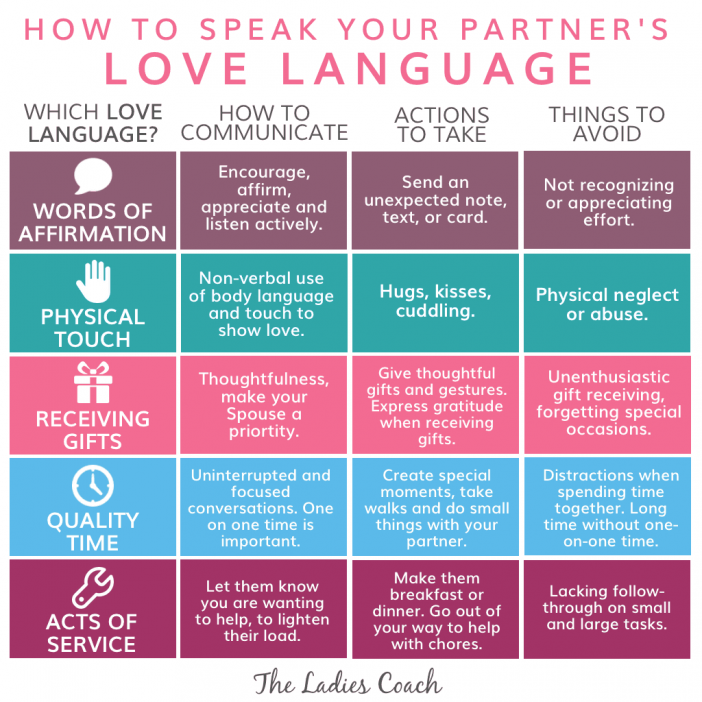New week, new self-knowledge theory to unpack. Are you ready? We already talked about professional life, but today it’s time to dive into love life. How can we use self-knowledge to improve communication with our partner? How can it even help us finding a good match? As I already told you multiple times throughout my last posts, knowing yourself allows you to adjust to your environment and understand your needs. Therefore, it can definitely come in handy for your love life. However, today I want to go a bit further, by introducing you to a new theory: The 5 Love Languages.
ORIGIN AND PURPOSE OF THE THEORY

The theory of the 5 Love Languages originates from the 1992 eponymous book by Gary Chapman. This #1 New York Times bestseller has sold 12 million copies since its release. Its popularity probably lies in its simple, yet strong promise: learning to express love in your partner’s language. The author’s assumption is the following:
“Relationships grow better when we understand each other. Everyone gives and receives love differently, but with a little insight into these differences, we can be confidently equipped to communicate love well.” (Source: 5lovelanguages.com)
By reading the book, you should be able to understand which language(s) matter the most to you, and to your (future) partner. That can help identify similarities but more importantly, differences, while giving you keys to deal with those in your everyday life.
I’m not going to lie; I haven’t read the book (yet). But I’ve enquired enough about it online to be able to present it to you today. I definitely think reading the original publication from which a theory comes is the best. But if reading is not your thing, or if you already struggle to find time to finish the 10 books that are waiting on your nightstand, know that it’s completely possible to get familiar with a theory in other ways. This article is one of them. You just have to keep reading!
THE 5 DIFFERENT LOVE LANGUAGES
Now that we have laid the foundations, it’s time to dig into the actual content of the theory: the 5 Love Languages. But before we start, let me give you a short disclaimer. People do not simply use one love language to communicate their feelings. Instead, they will probably have a preference order. The 5 Love Languages are a matter of hierarchy rather than of a single designated type. Now, let’s start with the first one: “words of affirmation”.
(Side note: if you are currently single, you can still learn from this article. Keep reading, it will become clearer after I introduce the theory).

This first one might be the most obvious of them all. It consists in using words to express your love. Saying “I love you” or complementing someone are examples of this language. For someone who prefers this language, it’s important to hear this type of sayings from their partner. When they are separated, it’s probably crucial that their partner expresses their affection through texts or calls. If you partner communicates in this way, you are probably familiar with receiving long spoken or written love declarations.

This second language might come off as a bit more surprising. The “acts of service” language translate the saying “actions speak louder than words”. People that affectionate this language are going to expect their lover to spend time and efforts in doing tasks with or for them. Nothing would be a better love proof than coming home to a freshly cleaned house for example. If they are moving out, they will strongly appreciate if their partner offers their help in carrying the boxes. If your partner prefers this language, try to anticipate the tasks they would need help with and offer to give a hand.

This third language can sometimes be perceived in a negative way. However, if receiving gifts is your love language, it doesn’t mean you expect your partner to spend large amounts of money to satisfy you. Rather, it means that you like receiving presents, regardless of their monetary value. You just like getting something, that is going to materialize your partner’s affection for you. It could be handmade, but it has to be gifted to you.

This fourth language is all about giving your partner your attention. Nothing matters more to them than getting to spend some time with you, whether it is to do something exotic or to simply stay at home and watch a movie. The most important is that you focus on them and on them only. Avoid inviting your friends to your dates or checking your phone every 5 minutes, as it would make them feel unloved.

This fifth and final language deals with physical contact. For “physical touch” language speakers, it is important that their partner provide them with appropriate touch. They feel loved when they get kissed or when their partner holds their hand. It doesn’t mean they are all into public display of affection, it can remain in the private sphere, but it has to be there when they need it. Obviously, we are also not talking about sexual intercourse in particular, but any form of physical contact, from the most subtle to the most intense one.
HOW TO MAKE THE MOST OUT OF THE THEORY?
As you were reading through this article, you probably started to distinguish which languages you’re dragged to the most and maybe even the ones that correspond to your partner. If you’re confused or if you want to make sure, share this article with your partner and discuss it together. And if this is still not enough and you want to get a sharp description of your love language preferences, you can take the official online test.
Now that you know for a fact what are yours and your partner’s hierarchy, what can you do with it? Well, you can start by identifying what your lover needs you to do/say for them to feel loved. And then, you should let them know what they should do/say in return. This way, you’ll avoid any possible miscommunication. It’s normal not to express your love in the same manner, the only important thing is to be aware of how you can still navigate through it without causing tensions. The following table summarizes the theory:

Now you might wonder, “how can this theory help me if I’m single?”. Well, it can support you on your search for a partner by allowing you to find someone that shares your hierarchy and therefore, with whom communication will be easy. And when you will find someone, whether your hierarchy is similar or not, it will help you implement the correct communication habits right from the start.
Whether you are single or in a relationship, you can also use this theory in other contexts. It is suited to any loving relationship: parents, siblings, children, friends… You can actually find dedicated books and resources online if it’s something that interests you.
Once again, I’ve tried showing you how self-knowledge helps navigating in life and in relationships, and how it is the key to a peaceful and happy environment. Keep in mind that what matters is to know yourself. The theories I share are only here to give you frameworks to structure your self-knowledge journey.
Now let me know in the comments below: did you know about the 5 Love Languages before? What is your personal love languages preference order? Do you think it matches your partner’s? If not, how do you cope with these differences?
Don’t forget to follow me on LinkedIn to stay informed of the publication of my new posts, one every Tuesday.
And until then, take care!




On my way to be in couple ! 😉 Thank you for this very complete article, I took great pleasure in reading it.
Hello Anne-Maëlle,
I’m glad you could enjoy the article even if you are not currently in a relationship. I think it can help anyone, whatever the situation they are in, as I explained in the article.
Hopefully see you soon on the blog,
Such an interesting post, I actually never thought about it before but it totally makes sense. I think as you mentioned, everyone subconsciously has a certain “type” of language they speak in love but having this put into a model, helps me to understand my partner better. I think this can also be adapted to friendships as well! 🙂
Hello Katharina,
Thank you for your feedback. I thought the exact same when I originally discovered this model. It makes so much sense but somehow we do not think about it! It can definitely be adapted to any loving relationship as I said.
See you next week on the blog,
Hi Juliette! I read this book a long time ago and I found it helpful. I love to study behaviors and most of all analyze mine… This book helped me to point out my love language and be able to identify the love language of the people around me! I do believe this is useful not just with your partner but with all the relationships you have in your life (friends, family, work) Everyone have a love language!
Hello Isabela,
Thanks for your feedback. I hope you still found this article useful despite already knowing a lot about this theory. I definitely agree, any relationship can benefit from this knowledge, regardless of its nature.
See you soon on the blog hopefully,